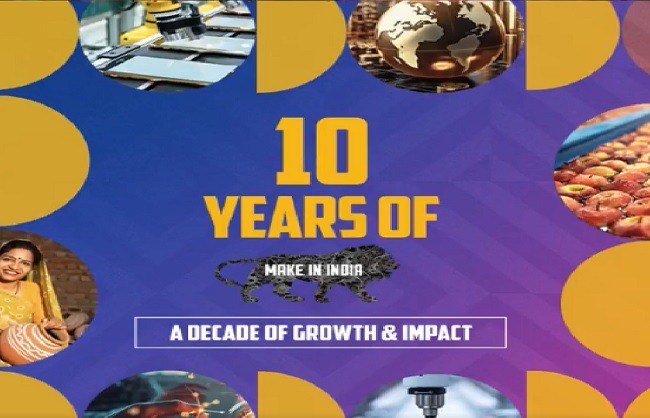New Delhi, September 25 (HS). Make in India has completed 10 years. It was launched on September 25, 2014 under the visionary leadership of Prime Minister Narendra Modi. This initiative has made the country a leader in global manufacturing. It is the effect of Make in India that in the last ten years, one startup was launched in India every hour. By June 30, 2024, the number of recognized startups in the country has increased to 1,40,803, creating more than 15.5 lakh direct jobs.
In a statement issued on Wednesday, the Ministry of Commerce and Industry said that the 'Make in India' initiative launched on 25 September 2014 has completed a historic decade to make India a global manufacturing hub. Under the visionary leadership of Prime Minister Modi, this program has played a key role in promoting domestic manufacturing, promoting innovation, enhancing skill development and facilitating foreign investment. The ministry said that India's manufacturing revolution has gained momentum with a focus on innovation, investment and self-reliance.
A glimpse of the impact of 10 years of Make in India –
Foreign Direct Investment (FDI): India has attracted cumulative inflows of US$ 667.4 billion from 2014 to 2024, representing a growth of 119 per cent over the previous decade (2004-14). These investment flows are spread across 31 states and 57 sectors, promoting growth across diverse industries. Similarly, most sectors are open to 100 per cent FDI under the automatic route, except for a few strategically important sectors. FDI equity inflows in the manufacturing sector have reached US$ 165.1 billion over the last decade, representing a growth of 69 per cent over the previous decade (2004-14), which saw inflows of US$ 97.7 billion.
Production Linked Incentive (PLI) Scheme: The PLI schemes launched in 2020 have resulted in investments of Rs 1.32 lakh crore ($16 billion) by June 2024. Manufacturing output has recorded a significant increase of Rs 10.90 lakh crore ($130 billion). Over 8.5 lakh jobs have been created directly and indirectly due to this initiative.
Exports and Employment: India's merchandise exports are projected to exceed US$437 billion in FY2023-24. This has led to a surge in exports, with PLI schemes adding an additional Rs 4 lakh crore to production, while total employment in the manufacturing sector is projected to grow from 57 million in FY17-18 to 64.4 million in FY2022-23.
Ease of Doing Business: India's rise from 142nd rank in 2014 to 63rd rank in 2019 in the World Bank's Ease of Doing Business Report reflects India's commitment to improving business conditions. At the same time, more than 42 thousand non-compliances have been reduced, while 3,700 provisions have been decriminalized. The Public Trust (Amendment of Provisions) Act-2023 was passed by the Lok Sabha on July 27, 2023 and by the Rajya Sabha on August 2, 2023, which has decriminalized 183 provisions in 42 central acts.
Major reforms of Make in India –
Semiconductor Ecosystem Development: The Semicon India program worth Rs 76,000 crore aims to provide impetus to semiconductor and display manufacturing by facilitating capital support and technical collaboration. India has developed policies to support every segment of the semiconductor ecosystem, focusing not just on fabs but also on packaging, display wires, OSAT, sensors and more.
National Single Window System (NSWS): Launched in September 2021, the platform simplifies the investor experience, integrating clearances from 32 ministries or departments and 29 states and union territories, leading to faster approvals.
PM Gatishakti: PM Gatishakti National Master Plan (NMP), a GIS based platform with portals of various ministries or departments of the government, was launched in October, 2021. It is a transformational approach to facilitate data-based decisions related to integrated planning of multimodal infrastructure, thereby reducing logistics costs.
National Logistics Policy (NLP): Aimed at reducing logistics costs and increasing efficiency, the NLP, launched in 2022, is the key to making Indian products more competitive globally.
Industrial Corridors and Infrastructure: Under the National Industrial Corridor Development Programme, 12 new projects have been approved for development of 11 industrial corridors with an estimated investment of Rs 28,602 crore. These corridors enhance India's competitiveness by providing world-class infrastructure.
One-District-One-Product (ODOP): The ODOP initiative has boosted local economic development by promoting indigenous products and craftsmanship in India, Unity Malls are being set up in 27 states to provide platforms for these unique products.
Startup India: With an aim to create a strong ecosystem to foster innovation and encourage investments, the Government launched the Startup India initiative on 16 January 2016. The Government’s sustained efforts under the Startup India initiative have increased the number of recognized startups to 1,40,803 as of 30 June 2024, generating over 15.5 lakh direct jobs.
According to the ministry, the central government has adopted a comprehensive and multi-pronged approach to promote domestic and foreign investment, thereby promoting a strong and dynamic economic environment. From historic reforms like the Goods and Services Tax (GST) and reduction in corporate tax to far-reaching measures aimed at ease of doing business and streamlining FDI policies, every step is towards creating a more investment-friendly ecosystem. Apart from this, initiatives like Phased Manufacturing Program (PMP), Public Procurement Order and Quality Control Order (QCO) are focused on promoting domestic manufacturing and enhancing product quality.
 look news india
look news india
